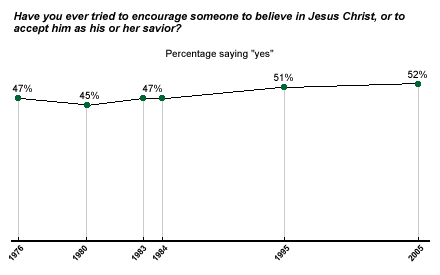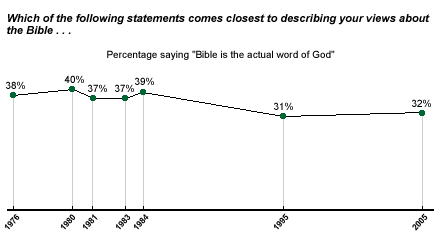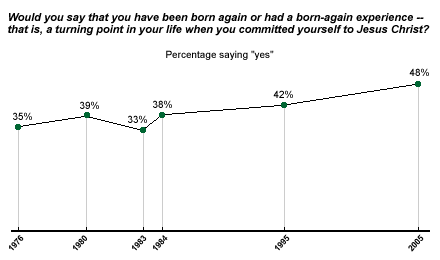In the months following the November 2004 elections, political pundits spent a lot of time discussing evangelical Christians. Many analysts credit this group with President George W. Bush's victory and the victories of many Republican senators and representatives as well. Evangelicals appear to be gaining greater political influence, as evidenced by the Terri Schiavo case and "Justice Sunday," a recent national telecast in which evangelical Christians protested the filibustering of Bush's judicial nominees.
It has been difficult for experts to get an accurate read on the percentage of evangelicals in the United States, and estimates can vary widely. Looking only at the basic ║┌┴¤═° Poll self-identification question, "Do you consider yourself to be born-again or evangelical?", it would appear evangelical Christians make up a sizable portion of Americans -- 42% according to an April 18-21 poll*. However, when taking a different approach and analyzing respondents' answers to three questions that most evangelical leaders would say are core evangelical doctrine, only 22% of Americans fit the description of an evangelical in ║┌┴¤═°'s May 2-5 poll**. (That number is further reduced to 18% if it is limited to those who are Protestants or unaffiliated Christians.)
Evangelical "Criteria": Faith Sharing, Biblical Inerrancy, and a Born-Again Experience
Central to core evangelical beliefs is the responsibility to share one's faith with others. To "evangelize" means to share the "evangel" -- literally the "good news." For evangelicals, an individual's eternal salvation rests solely on accepting Jesus Christ as one's Lord and Savior. Jesus' death and resurrection are atonement for sin and a promise of eternal life, which are only given to those who accept him as Lord and Savior. Evangelical Christians feel a responsibility to share this belief with others, because absent this belief, individuals are eternally lost.

Americans appear to be particularly willing to share their faith; a majority of Americans do not seem to think religion should be a "private matter," at least when it comes to encouraging others to believe in Jesus Christ. Fifty-two percent of Americans say they have "tried to encourage someone to believe in Jesus Christ, or to accept him as his or her savior." From 1976 to 1984, an average of 46% said they had tried to encourage others to believe.
The Web sites of many evangelical churches contain a "statement of belief" page, in which Web surfers can find information about the doctrinal stance of a particular church. With minor variations, these churches say they believe the Bible to be the word of God, "without error," which appears to be a core doctrine of evangelical faith.
Belief that the Bible is the "actual word of God" has, for the most part, declined since the mid-1980s. From 1976 to 1984, an average of 38% of Americans held this belief; since 1991, support has averaged 32%.

The third generally accepted criterion of evangelical faith is a born-again or conversion experience that results in committing one's life to Jesus Christ. Belief in Jesus as Lord and Savior is not merely a matter of intellectual assent; in evangelical tradition this belief leads to a life-changing commitment.

The percentage of Americans who say they have had a born-again experience, leading to a commitment to Jesus Christ, has increased significantly now compared to when this question was last asked in the late 1970s and early 1980s. From 1976 to 1984, an average of 37% of Americans claimed to have had such an experience. In 2005, 48% of adults -- nearly half the population -- say they have been born again.
Bottom Line
When looking at the percentage of Americans who say yes to all three of these questions, slightly more than one in five (22%) American adults could be considered evangelical. Though this overall indicator of evangelism has remained fairly steady, one contributing factor has shown a marked increase in the few decades: the percentage of individuals who say they have had a born-again experience. The data suggest that individuals' personal experiences -- what 18th-century English reformer John Wesley called the "warmed heart" -- have become a more central part of what it means to be evangelical.
*Results are based on telephone interviews with 1,003 national adults, aged 18 and older, conducted April 18-21, 2005. For results based on the total sample of national adults, one can say with 95% confidence that the margin of sampling error is ┬▒3 percentage points.
**Results are based on telephone interviews with 1,005 national adults, aged 18 and older, conducted May 2-5, 2005. For results based on the total sample of national adults, one can say with 95% confidence that the margin of sampling error is ┬▒3 percentage points.
